Retirement Savings in the UAE: Smart Strategies to Secure Your Future
Time to Read:
10

Why Retirement Planning is Critical for UAE Residents
Retirement Savings in the UAE: Smart Strategies to Secure Your Future starts with a shocking fact: 76% of UAE expatriates lack a formal retirement plan. If you're living and working in the UAE, this guide covers the essential strategies for building financial security.
Quick Answer: Key Retirement Strategies for UAE Residents
- Start Early: Save 15-20% of your income for compound growth.
- Don't Rely on EOSB: Your End-of-Service Benefit is not a full retirement plan.
- Diversify: Spread investments across stocks, bonds, and real estate.
- Plan for Healthcare: Medical costs rise significantly after retirement.
- Consider Residency: The UAE Retirement Visa requires AED 1 million in savings or property.
- Use Tax-Free Advantage: The UAE's zero income tax accelerates savings.
The UAE's tax-free environment offers incredible wealth-building opportunities, but there's a catch: no government pension awaits you at retirement.
Unlike in many Western countries, expatriates in the UAE are fully responsible for funding their retirement. Your End-of-Service Benefit (21-30 days of salary per year worked) is a helpful boost, but it's not enough for a comfortable retirement.
The good news? Starting early with the right strategies can build substantial wealth. Saving just AED 5,000 per month from age 25 with a 7% annual return could grow to over AED 10 million by retirement. This means your decisions today directly impact your financial freedom tomorrow.
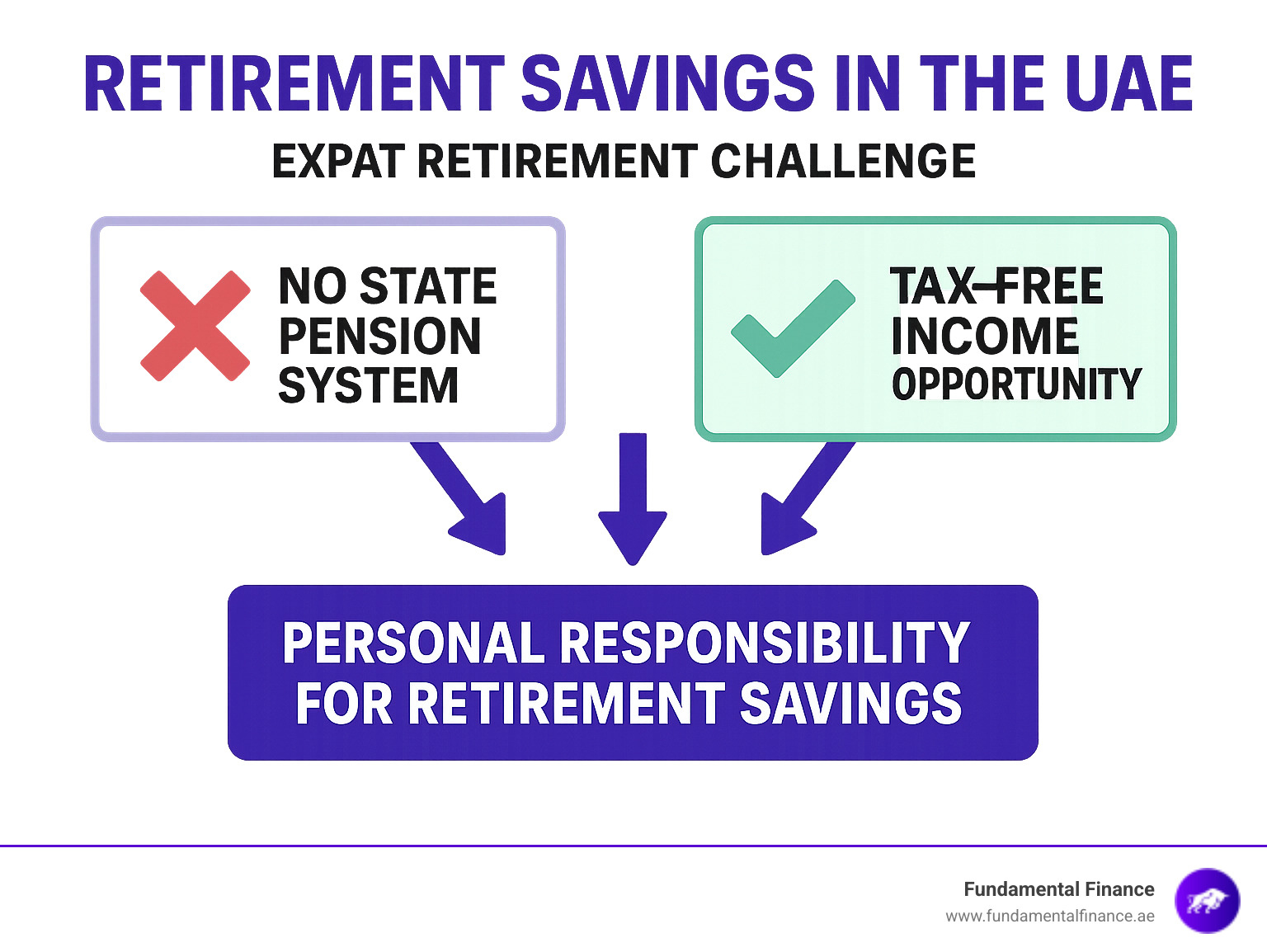
The Expat's Dilemma: Why Retirement Planning is Non-Negotiable in the UAE
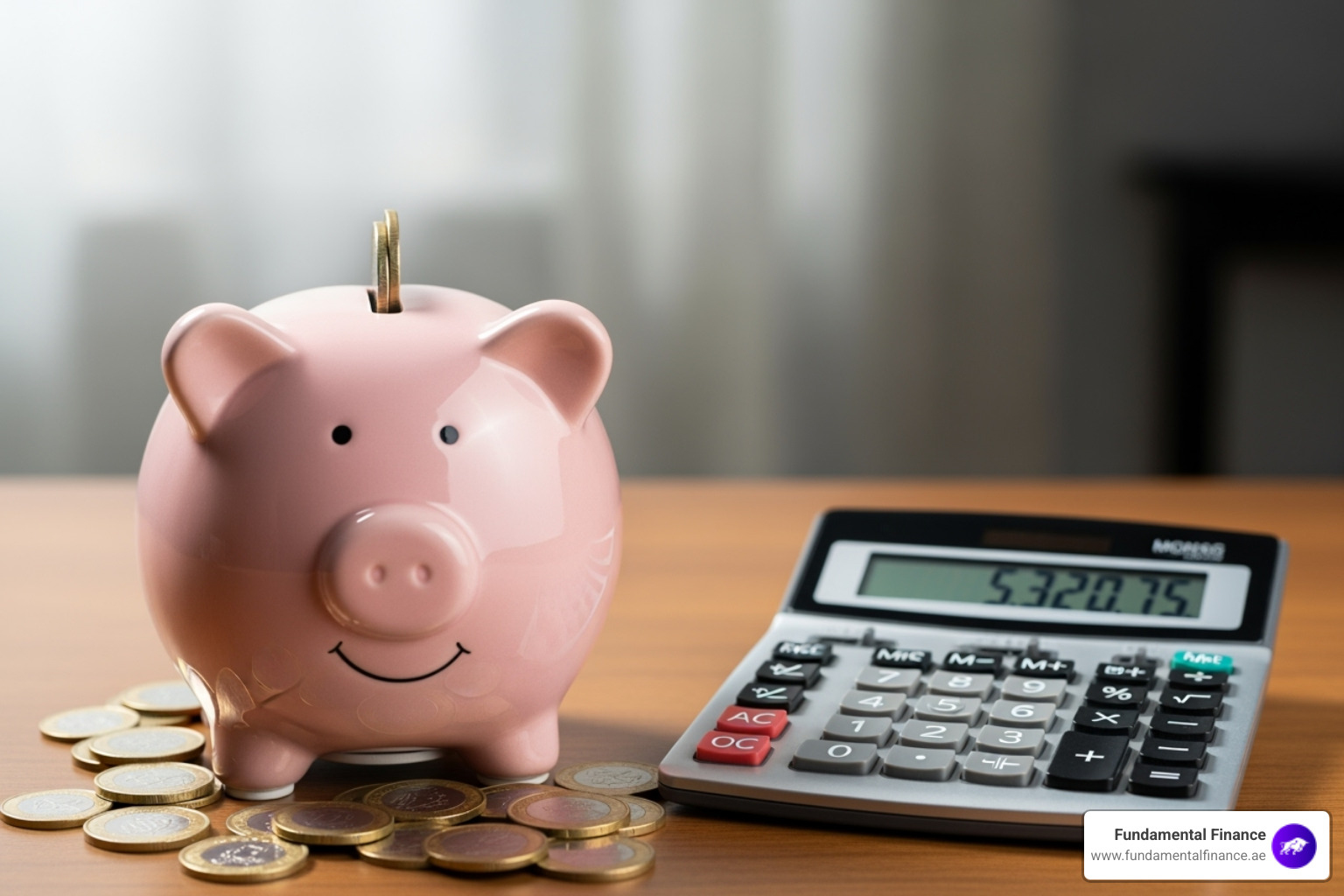
Earning a tax-free salary in the UAE is a dream, but it comes with a reality check: the entire responsibility for your retirement rests on your shoulders. As an expatriate, you are flying solo. There is no government safety net or state pension, which makes Retirement Savings in the UAE: Smart Strategies to Secure Your Future absolutely critical.
The Great Divide: Retirement for UAE Nationals vs. Expatriates
There's a clear divide in the UAE's retirement landscape. UAE nationals have government-backed pension schemes through the General Pension and Social Security Authority (GPSSA), with mandatory contributions building a solid retirement foundation.
For expatriates, the story is different. The UAE provides no state pension for non-nationals, a trade-off for the tax-free income and lifestyle. This means every dirham for retirement must come from your own pocket. Unlike friends back home who may have government support, you are the sole architect of your retirement plan.
Is Your End-of-Service Gratuity Enough?
Many expats mistakenly believe their End-of-Service Benefit (EOSB) will cover their retirement. This is a dangerous misconception.
Your EOSB provides 21 days of basic salary for the first five years of service and 30 days for each year after. While this lump sum is helpful—about 255 days' salary after 10 years—it's nowhere near enough to fund 20-30 years of retirement. The EOSB should be viewed as a helpful starting point, not your complete retirement solution. Treat it as bonus money to invest wisely. Young professionals can learn more about building strong financial foundations early.
The Hidden Problems: Inflation and Future Healthcare Costs
Two silent threats can erode your savings: inflation and healthcare costs.
Inflation, typically 2-3% annually, means your money's buying power decreases over time. A lifestyle costing AED 10,000 monthly today could require AED 18,000 in 20 years. Your savings must grow faster than inflation to keep pace.
Healthcare costs are an even bigger challenge. Employer-provided health insurance disappears upon retirement. In Dubai, a specialist consultation can cost AED 700-1,500, and insurance premiums can rise 8-10% annually as you age. For example, a policy costing AED 20,000 at age 55 could exceed AED 45,000 by age 70. With mandatory health insurance in the UAE, these are non-negotiable expenses that must be factored into your retirement plan.
Building Your Foundation: Key First Steps to Retirement Savings
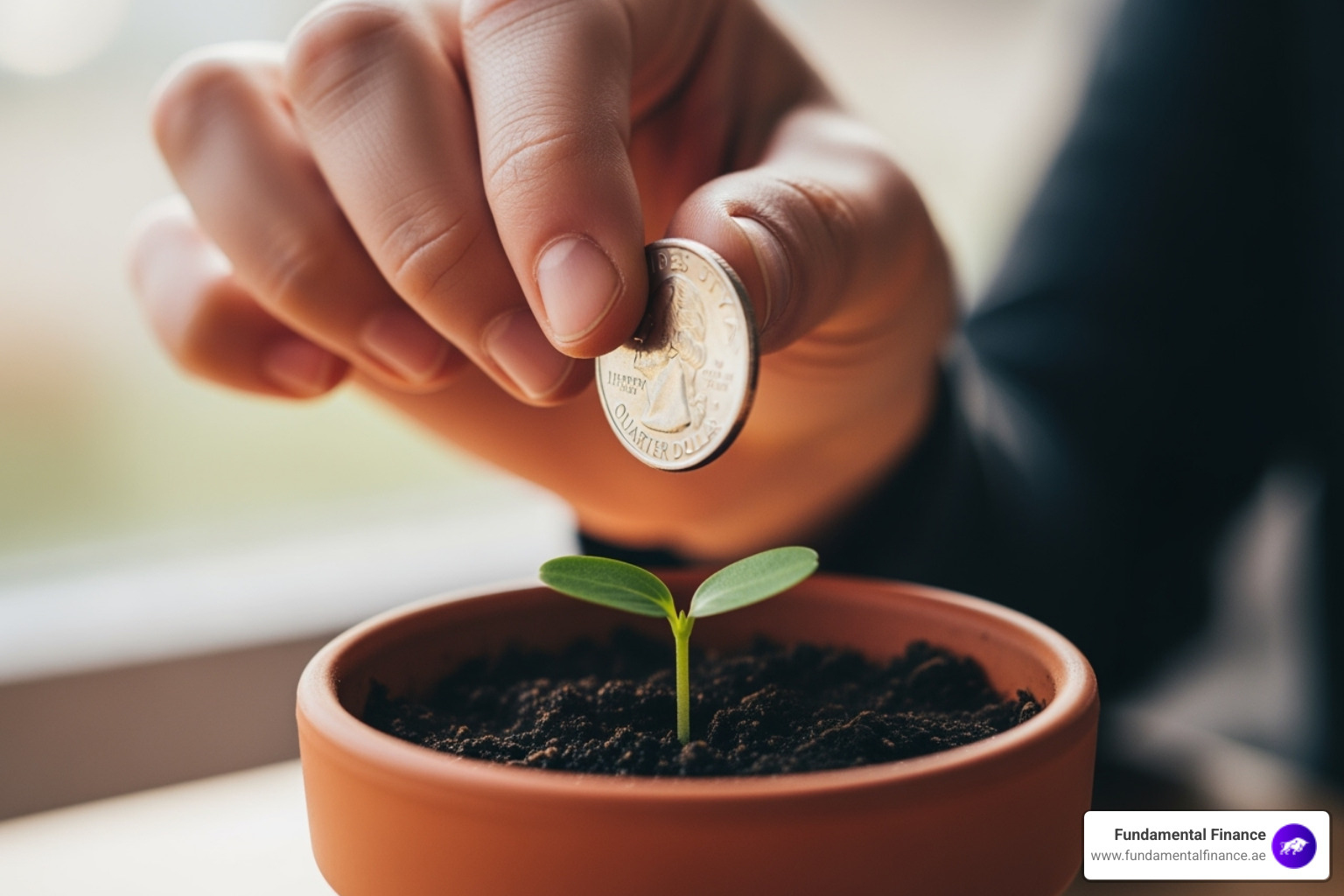
Think of retirement planning like planting a tree: the best time was 20 years ago, but the second-best time is today. For UAE expats, building a solid retirement foundation is essential, as your future depends entirely on the decisions you make now. Success requires consistency, clear goals, and discipline.
The Unbeatable Power of Starting Early and Compound Interest
When it comes to retirement savings, time matters more than the amount you save. Thanks to compound interest, your money doesn't just grow—it multiplies. Your earnings generate their own earnings, creating a snowball effect.
Consider this powerful example: saving AED 5,000 per month starting at age 25 with a 7% annual return could yield over AED 10 million by retirement. If you wait until 35, that same plan would only reach around AED 4.5 million. The 10-year delay costs over 5 million dirhams! The magic of compound interest explained shows why starting with your first paycheck is so crucial. Starting early reduces your future financial burden while maximizing your wealth potential.
How to Set Clear and Achievable Retirement Goals
Saving for retirement without clear goals is like driving without a destination. Specific goals transform wishful thinking into a concrete plan. Start by envisioning your retirement lifestyle: where will you live? What will you do? These choices determine how much you'll need.
Next, decide on your desired retirement age. The earlier you retire, the more you need to save. Then, calculate your "magic number." A helpful guide is the 4% withdrawal rule, which suggests you can safely withdraw 4% of your total savings annually. If you need AED 250,000 per year in retirement, multiply that by 25 to get your target: AED 6.25 million. While this sounds large, compound interest will do much of the heavy lifting if you start early. Use our Budget Calculator to estimate expenses and set realistic targets.
Master Your Money: Budgeting and Financial Literacy
You can't build wealth without knowing where your money goes. Financial literacy is the cornerstone of successful retirement planning, starting with budgeting. Track your income and expenses for a month to understand your spending habits.
Try the 50/30/20 rule: 50% of your income for needs, 30% for wants, and 20% for savings and investments. Aim to allocate at least 15-20% of your income to long-term retirement savings.
An emergency fund is also vital. As an expat, you face unique uncertainties. Aim for 6-12 months of expenses in an accessible account. This safety net prevents you from dipping into retirement funds during unexpected events. The UAE offers great resources to improve your financial skills, including budgeting apps for UAE residents. The more you understand about money, the better your decisions will be.
Smart Strategies for Growing Your Retirement Savings in the UAE
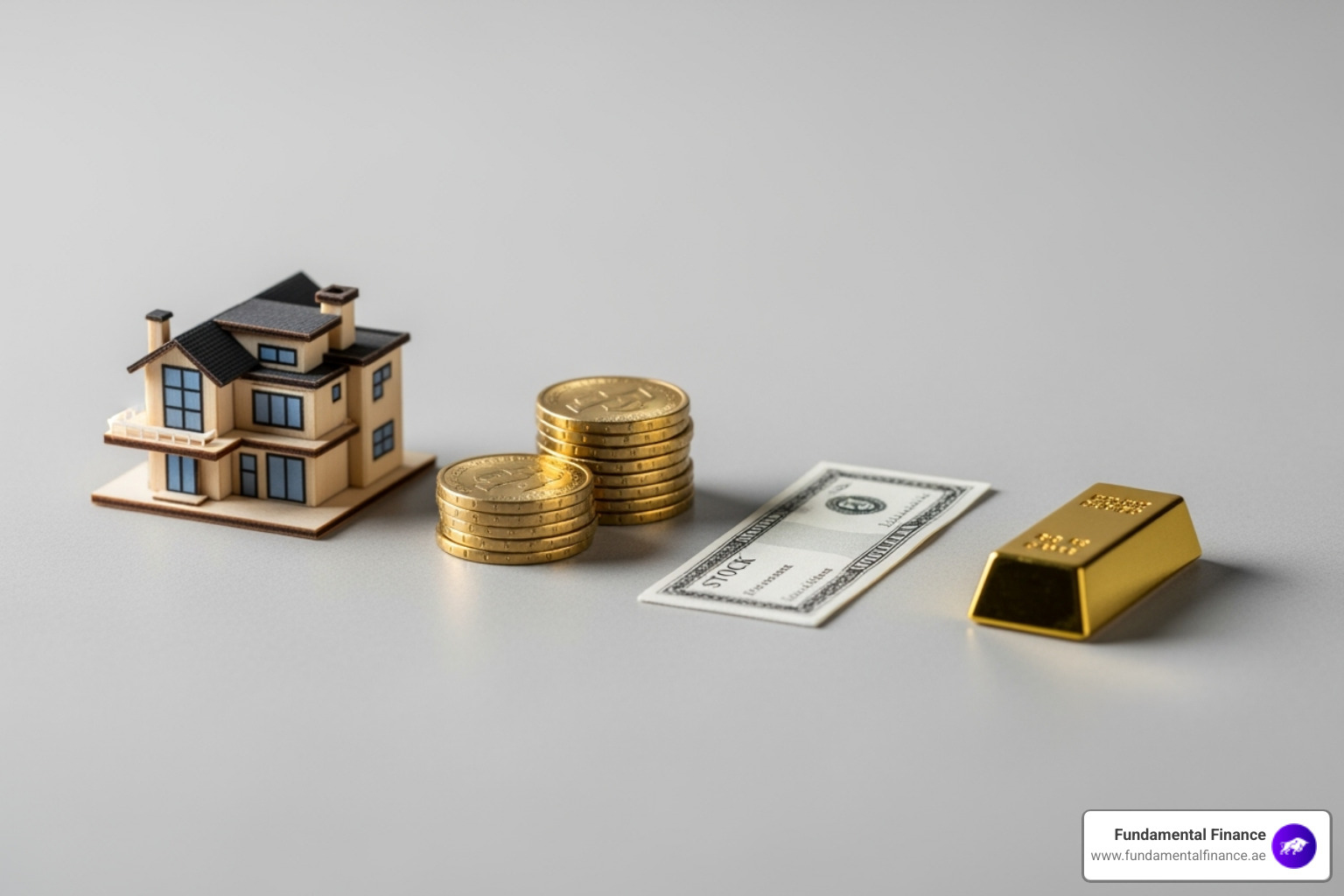
With a foundation of clear goals and budgeting, it's time to accelerate your Retirement Savings in the UAE: Smart Strategies to Secure Your Future. This involves turning your savings into a wealth-building machine through diversification, smart investment choices, and creating passive income streams.
The Golden Rule: Why Diversification is Crucial for Your Future
Putting all your money in one place is incredibly risky. Diversification is your financial insurance policy, protecting you from market volatility while maximizing steady growth. By spreading money across different asset types, you create a safety net where one asset's poor performance can be offset by another's gains.
Key asset classes to consider include:
- Global Stocks & ETFs: Gain ownership in hundreds of companies worldwide with a single investment. ETFs offer instant variety at a lower cost.
- Bonds & Sukuk: These Islamic bonds provide stability and regular income, which is crucial as you near retirement.
- UAE & International Real Estate: Property can offer both capital growth and rental income, though it is less liquid than stocks.
- Gold & Commodities: These can serve as a hedge against inflation and economic uncertainty.
Exploring Your Options: Savings Plans and Employer Schemes
Beyond personal investments, structured savings options are available for expats. Flexible savings plans are valuable for their portability, which is ideal for globally mobile professionals.
Many employers, especially in free zones, offer workplace savings plans like the DIFC Employee Workplace Savings (DEWS) Plan. If your employer offers to match your contributions, take it—this is essentially free money and an instant 100% return on that portion of your savings.
The new Golden Pension Scheme is another voluntary program allowing you and your employer to contribute to a portable retirement fund. When evaluating plans, look for flexibility, low fees, diverse investment options, and portability.
Creating Passive Income Streams for a Comfortable Retirement in the UAE
Building passive income streams means creating money that flows to you without active work. It's like having mini-businesses working for you 24/7.
- Rental income from property is a popular strategy. Whether in the UAE or abroad, it can provide steady monthly cash flow.
- Dividend-paying stocks offer another excellent source of income, as you get paid to own pieces of successful companies.
- Fixed-income instruments like bonds provide predictable returns to supplement your retirement budget.
The goal is to create multiple income streams for greater financial security. The UAE's tax-free environment gives you a significant advantage, as every dirham earned from investments stays with you, compounding your wealth faster.
Navigating the UAE Landscape: Visas, Taxes, and Long-Term Planning
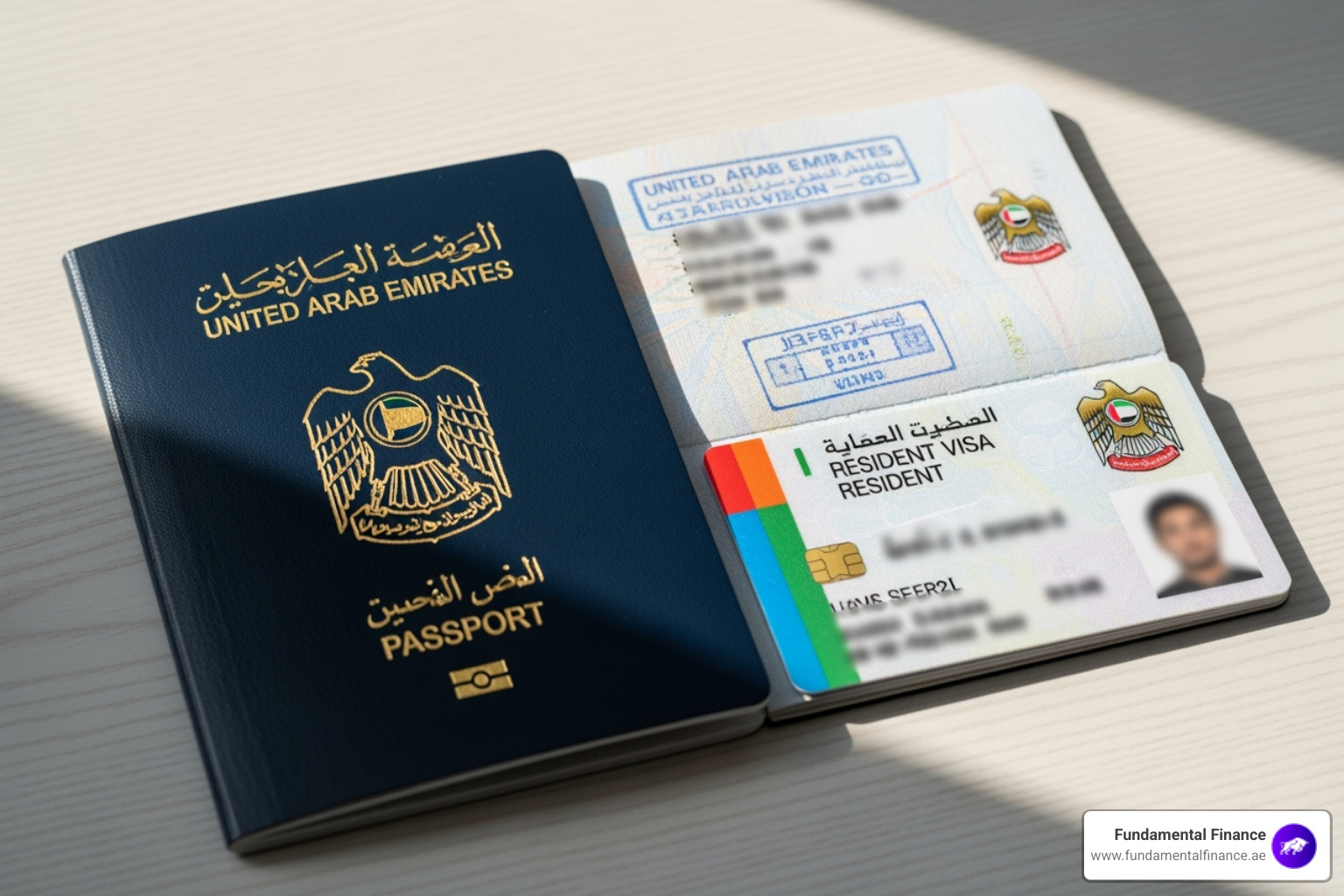
After years of building tax-free savings in Dubai, can you stay to enjoy your retirement? The answer is increasingly yes. Retirement Savings in the UAE: Smart Strategies to Secure Your Future involves understanding the unique landscape of visas, taxes, and long-term planning.
Staying in the Sun: Long-Term Residency and Retirement Visas
The UAE has created pathways for retirees to call the country home. The UAE Retirement Visa is available to those aged 55 and over who meet financial requirements, ensuring you can support yourself. To qualify, you must meet one of these criteria: a monthly income of at least AED 20,000 (AED 15,000 in Dubai), financial savings of AED 1 million, or UAE property worth at least AED 1 million. This five-year renewable visa offers long-term security.
The Golden Visa offers 5 or 10-year residency for individuals who have made significant contributions, such as investors with at least AED 2 million in capital or property. For the latest information, always check the official eligibility criteria for UAE residency.
A Unique Advantage: How Dubai's Tax-Free Environment Impacts Your Retirement Savings in the UAE
The UAE's zero income tax and zero capital gains tax policies are a massive advantage, allowing your savings to grow much faster than in most countries. While your friends back home might lose a significant portion of their gains to taxes, you keep it all.
However, there's a crucial complexity: your home country might still tax your money. US citizens must file US taxes regardless of where they live. UK expats may face UK income tax on pension withdrawals and inheritance tax on worldwide assets. South African residents deal with a worldwide tax system. Planning is essential. You must understand the tax implications when you access funds or retire elsewhere. Our Currency Converter can help you track exchange rate movements.
Securing Your Legacy: The Importance of Estate Planning in Dubai
Estate planning is a critical, often overlooked, piece of your financial strategy. What happens to your assets when you're gone? In the UAE, inheritance for Muslims defaults to Sharia principles. For non-Muslims, this could mean your assets are distributed in ways you never intended, causing hardship for your family.
Fortunately, solutions exist. The DIFC Wills Service Centre and ADGM Wills allow non-Muslims to register wills that ensure their personal wishes are followed, avoiding Sharia law complexities. Proper estate planning protects your wealth and your loved ones from lengthy legal battles. It provides peace of mind, ensuring you control your legacy.
Frequently Asked Questions about Retirement in the UAE
Planning for retirement as an expat brings up many questions. Here are answers to common concerns about Retirement Savings in the UAE: Smart Strategies to Secure Your Future.
How much should I save for retirement in the UAE?
This is the most common question, and the answer depends on your desired lifestyle and retirement location. A good benchmark is to save 15-20% of your monthly income. If you're starting late, you may need to increase this to 25-35%.
To find your target number, multiply your desired yearly retirement income by 25. This is based on the 4% withdrawal rule. For example, to have AED 250,000 per year, you'd need about AED 6.25 million saved. Your actual needs will depend on inflation, healthcare, and travel plans. For a personalized estimate, use an online retirement calculator.
What are the biggest challenges for expats planning retirement in Dubai?
While Dubai offers incredible opportunities, retirement planning here has unique challenges:
- No state pension system for expats means you are entirely self-reliant.
- Long-term residency uncertainty was a traditional concern, though new visa options help.
- Dubai's high cost of living requires substantial savings to maintain your lifestyle.
- Currency fluctuations can impact your purchasing power if you plan to retire elsewhere.
- Navigating cross-border tax and legal systems requires careful planning and often professional advice.
These challenges highlight why early and strategic planning is crucial for expat retirement success.
What happens to my pension from my home country if I live in the UAE?
Your home country pension typically stays in that country, and you can usually access it at the eligible age, regardless of where you live. You may have options to transfer your pension to a qualifying international plan, like a UK SIPP, for more flexibility.
However, be aware of potential tax implications. Even though you live tax-free in the UAE, your home country might still tax your pension withdrawals. UK expats could face UK income tax, and US citizens must always file US taxes. Consulting with a cross-border financial advisor who understands both UAE and your home country's rules is key to structuring your pension access efficiently and avoiding tax surprises. Your home country pension should be a supplement to, not a replacement for, the savings you build in the UAE.
Conclusion: Take Control of Your Financial Future Today
This guide has shown the challenges and incredible opportunities for expats planning their retirement in the UAE. We've seen that while 76% of expats lack a formal plan and the End-of-Service Benefit is insufficient, the path to a secure retirement is clear.
The UAE's tax-free environment and the power of compound interest are remarkable advantages. Starting early and saving 15-20% of your income can turn modest savings into millions.
The key strategies are your roadmap to financial freedom: diversify investments, build passive income streams, and plan for long-term residency and healthcare costs. Proactive planning today prevents financial stress tomorrow.
With great opportunity comes great responsibility. Without a government pension, every financial decision you make today directly shapes your tomorrow.
At Fundamental Finance, we believe financial literacy should be accessible and engaging. Our free FunFi app uses our AI assistant Toro and interactive features to turn complex topics like budgeting and saving into bite-sized lessons.
Your future self is counting on you. Whether it's downloading a budgeting app or opening your first investment account, the most important step is the first one. Don't become another statistic. Use these strategies to build the secure, comfortable retirement you deserve.
Start your journey to financial wellness today. The best time to secure your future is right now.
.avif)
Get Early Access
to Our Mobile App
Be among the first to explore FunFi, designed to make mastering money simple, practical, and fun!

.avif)